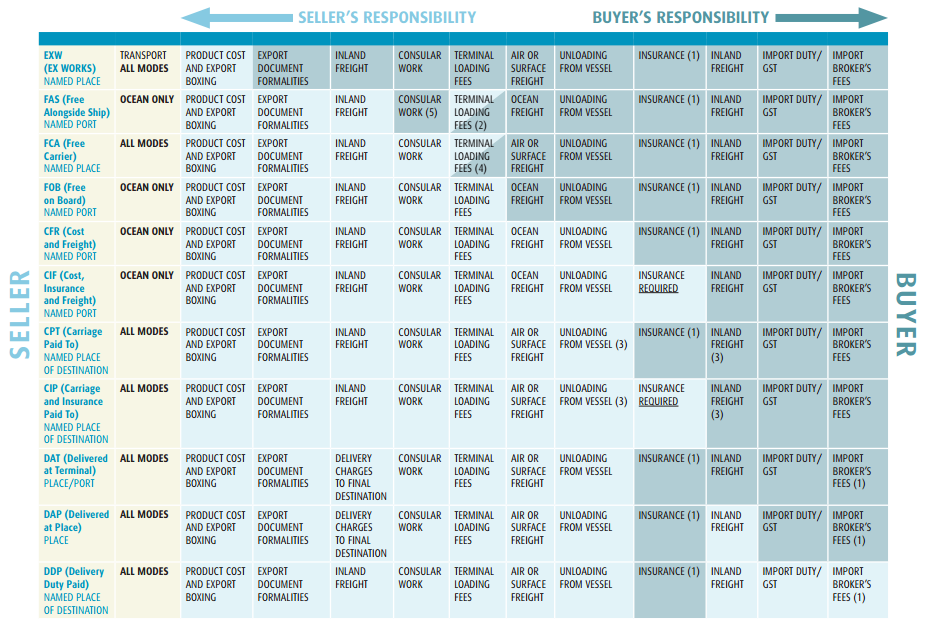Incoterms, short for International Commercial Terms, are sales terms defined by the International Chamber of Commerce (ICC) in Paris, France. The book Incoterms® 2010 (2010 Edition) goes over the ICC rules for the use of domestic and international trade terms. The eighth revision, Incoterms 2010, went into effect January 1, 2011 to simplify and clarify responsibilities between international buyers and sellers of goods. See the transfer of responsibility from seller to buyer under each Incoterm.
Download INCOTERMS handout in PDF
- PDF Notes
- Departure – Any Mode of Transport
- Arrival – Any Mode of Transport
- Rules for Sea and Inland Waterway Transport
- Changes Under Incoterms 2010
-
- Negotiated outside of the INCOTERMS. Buyer or seller may have additional “insurable interest” and prudence may indicate purchase of additional coverage.
- Terminal fee goes to seller, vessel loading to buyer.
- Item depends on named place.
- Terminal charge goes to seller if loaded at seller’s door, terminal charge goes to buyer if loaded at carrier’s terminal.
- Seller assists in obtaining consular work. International Chamber of Commerce (ICC) arbitration is available if noted as part of the contract between the seller and buyer.
-
- EXW–Ex Works (…named place of delivery)
Main carriage not paid by seller. - FCA–Free Carrier (…named place of delivery)
Main carriage not paid by seller. - CPT–Carriage Paid to (…named place of destination)
Main carriage paid by seller
Seller contracts for carriage - CIP–Carriage and Insurance Paid to (…named place of destination)
Main carriage paid by seller
Seller contracts for carriage
Seller contracts for insurance
- EXW–Ex Works (…named place of delivery)
-
- DAT–Delivered at Terminal (…named terminal at port or place of destination)
- DAP–Delivered at Place (…named place of destination)
- DDP–Delivered Duty Paid (…named place of destination)
DAT means the seller delivers (or meets their obligation) when the goods are unloaded from the carrier (arriving means of transport) and are placed at the disposal of the buyer at a named terminal at the named port or place of the destination. The seller bears all risks involved in bringing the goods to and unloading them at the terminal at the named port or place of destination. The name “terminal” can be a quay, warehouse, container yard or road, rail or an air cargo terminal. The seller clears the goods for export but is not obligated to clear the goods for import, including paying customs duties and/or fees upon import or carry out import customs formalities.
DAP means the seller delivers (or meets their obligation) when the goods are ready for unloading from the carrier (arriving means of transport) and are placed at the disposal of the buyer at a named place of the destination. Costs incurred by the seller for unloading under its contract of carriage cannot be recovered by the buyer unless otherwise agreed upon between both parties. The seller bears all risks involved in bringing the goods to the named place of destination. The seller clears the goods for export but is not obligated to clear the goods for import, including paying customs duties and/or fees upon import or carry out import customs formalities.
-
- FAS–Free Alongside Ship (…named port of shipment)
Main carriage not paid by seller - FOB–Free on Board (…named port of shipment)
Main carriage not paid by seller - CFR–Cost and Freight (…named port of destination)
Main carriage paid by seller
Seller contracts for carriage - CIF–Cost Insurance and Freight (…named port of destination)
Main carriage not paid by seller
Seller contracts for carriageSeller contracts for insurance
- FAS–Free Alongside Ship (…named port of shipment)
-
- The term “Ship’s Rail” is now referenced as “loaded on board the vessel”.
- The transfer of risk follows the transfer of cost.
- Incoterms (FOB) are not applicable towards containerized shipments since they are not delivered to the vessel, but rather to the port to be gated-in and staged into a slot for future loading.
- The seller should inform the buyer of what is (and is not) included in the seller’s freight agreement with the carrier. The buyer does not pay for unloading cost if they are already included in the freight agreement.
Incoterms are important for quoting prices and negotiating contracts. They are often used for domestic transactions as well as international transactions. In legal documents, always name the place/port/terminal of shipment or destination as well as the applicable Incoterm. For example, “FOB Port of Los Angeles.” Below is a helpful video produce by UK Trade & Invest on understanding and using Incoterms 2010.
LEARN MORE ABOUT INCOTERMS 2010

